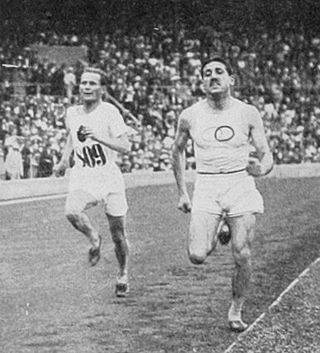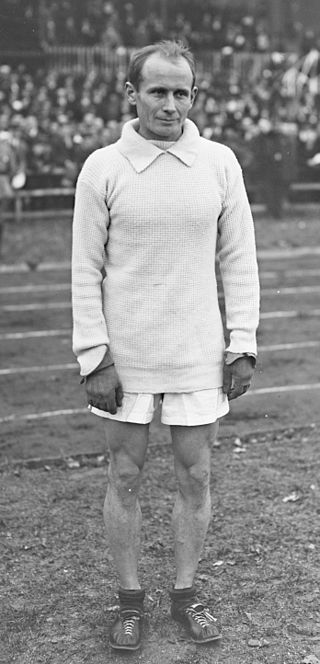
The 1912 Summer Olympics, officially known as the Games of the V Olympiad and commonly known as Stockholm 1912, were an international multi-sport event held in Stockholm, Sweden, between 6 July and 22 July 1912. The opening ceremony was held on 6 July.
At the 1912 Summer Olympics, nine swimming events were contested. Swimming events were held in a 100 m course built in Stockholm harbor. For the first time, women's events were part of the Olympic swimming program. The competitions were held from Saturday July 6, 1912, to Friday July 12, 1912. There was a total of 120 participants from 17 countries competing.

The men's 100 metres was a track and field athletics event held as part of the Athletics at the 1912 Summer Olympics programme. It was the fifth appearance of the event, which is one of 12 athletics events to have been held at every Summer Olympics. The competition was held on 6 July 1912 and on 7 July 1912. Seventy runners from 22 nations competed. NOCs could enter up to 12 athletes. The event was won by Ralph Craig of the United States, as the Americans swept the medals for a second time.

The men's 200 metres was a track and field athletics event held as part of the Athletics at the 1912 Summer Olympics programme. It was the fourth appearance of the event, which has appeared at every edition of the Summer Olympics since the 1900 Summer Olympics. The competition was held on July 10, 1912, and on July 11, 1912. 61 runners from 19 nations competed. NOCs could enter up to 12 athletes. The event was won by Ralph Craig of the United States, the nation's third victory in four Games. Another American, Donald Lippincott, took silver. Great Britain earned its first medal in the 200 metres with Willie Applegarth's bronze.

The men's 400 metres was a track and field athletics event held as part of the Athletics at the 1912 Summer Olympics programme. The competition was held on Friday, July 12, 1912, and on Saturday, July 13, 1912. Forty-nine runners from 16 nations competed. NOCs could enter up to 12 athletes. The event was won by Charles Reidpath of the United States, the nation's fourth title in the event. Hanns Braun of Germany took silver, the nation's first medal in the men's 400 metres.

The men's 1500 metres was a track and field athletics event held as part of the athletics at the 1912 Summer Olympics programme. The competition was held on Tuesday, July 9, 1912, and on Wednesday, July 10, 1912. Forty-five runners from 14 nations competed, including the Olympic champion from 1908, Mel Sheppard. NOCs could enter up to 12 athletes.

The men's 5000 metres was a track and field athletics event held as part of the Athletics at the 1912 Summer Olympics programme. It was the debut of the event, which along with the 10000 metre event replaced the 5 mile race held at the 1908 Summer Olympics. The competition was held on Tuesday, July 9, 1912, and on Wednesday, July 10, 1912. Thirty-one long-distance runners from eleven nations competed. NOCs could enter up to 12 athletes.

The Russian Empire (Russia) competed at the 1912 Summer Olympics in Stockholm, Sweden. 159 competitors took part in 62 events in 15 sports.

Norway competed at the 1912 Summer Olympics in Stockholm, Sweden. 190 competitors, 188 men and 2 women, took part in 58 events in 14 sports.

Finland competed at the 1912 Summer Olympics in Stockholm, Sweden. The Grand Duchy of Finland was an autonomous part of the Russian Empire at the time, which allowed Finland to compete separately of Russia Russia at the 1908 Summer Olympics due to Finland's special status. During the opening ceremony, Finland's team paraded under the national insignia flag of a Swedish-speaking female gymnastics club in Helsinki. 164 competitors, 162 men and 2 women, took part in 49 events in 10 sports.

Finland competed at the 1924 Summer Olympics in Paris, France. 121 competitors, all men, took part in 69 events in 12 sports.

Svensk Hjalmar Zakeus Andersson was a Swedish cross-country runner. He competed at the 1912 Summer Olympics held in Stockholm and won an individual silver and team gold medals. The course was rather hilly and approximately 12 km long; it was not made known to competitors before the race.

Carl Josef Ternström was a Swedish runner. He competed at the 1912 Summer Olympics in cross country events and won a team gold medal, finishing fifth individually. The course was rather hilly and approximately 12 km long; it was not made known to competitors before the race.

The men's 10,000 metres was a track and field athletics event held as part of the Athletics at the 1912 Summer Olympics programme. It was the debut of the event, which along with the 5000 metres replaced the 5 mile race held at the 1908 Summer Olympics. The competition was held on Sunday, July 7, 1912, and on Monday, July 8, 1912. Thirty runners from 13 nations competed. NOCs could enter up to 12 athletes.

The men's 4 × 100 meters relay was a track and field athletics event held as part of the Athletics at the 1912 Summer Olympics program. It was the debut of the event, which along with the 4 × 400-meter relays marked the first relays of equal legs in the athletics program. The competition was held on Monday, July 8, 1912, and on Tuesday, July 9, 1912. NOCs could enter 1 team of 4 athletes, with up to 2 reserves.

The men's 3000 metres team race was a track and field athletics event held as part of the athletics at the 1912 Summer Olympics programme. It was the fourth appearance of a team race style event, though the first to be held at the distance of 3000 metres, which became the standard until the event was eliminated following the 1924 Summer Olympics. The competition was held on Friday, July 12, 1912, and on Saturday, July 13, 1912.

The men's marathon was a track and field athletics event held as part of the athletics at the 1912 Summer Olympics programme. The distance used was 40.2 kilometres, nearly 2 full kilometres shorter than that used in 1908 and since 1924. The competition was held on Sunday, July 14, 1912. 95 runners entered, but only 68 runners competed. NOCs could enter up to 12 athletes. With conditions described as "very hot", only 36 of the 68 competitors finished. The event was won by Ken McArthur of South Africa, the nation's first Olympic marathon victory.

The men's discus throw was a track and field athletics event held as part of the athletics at the 1912 Summer Olympics programme. The competition was held on Friday, July 12, 1912. Forty-one discus throwers from 15 nation competed. NOCs could enter up to 12 athletes. The event was won by Armas Taipale of Finland, the nation's first medal in the men's discus throw. Richard Byrd took silver and James Duncan took bronze to continue the United States' podium streak at five consecutive Games.
The men's team cross country was a track and field athletics event held as part of the Athletics at the 1912 Summer Olympics programme. It was the first appearance of the event. The competition was held on Monday, July 15, 1912.

The men's marathon event was part of the track and field athletics programme at the 1920 Summer Olympics. The distance of this race was 42.75 kilometres. The competition was held on Sunday, 22 August 1920. 48 runners from 17 nations competed. No nation had more than 4 runners, suggesting the limit had been reduced from the 12 maximum in force in 1908 and 1912. The event was won by Hannes Kolehmainen of Finland, the nation's first Olympic marathon medal and victory; Kolehmainen received his fourth gold medal, having won the 5000 metres, 10,000 metres, and individual cross country in 1912. Estonia and Italy also won their first marathon medals.


















